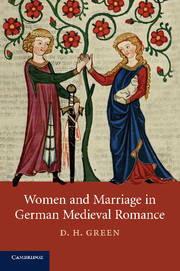5 - Parzival
Published online by Cambridge University Press: 09 November 2009
Summary
The three themes around which we have organised our discussion of Erec and Tristan (knighthood, love, marriage) are also combined in Parzival. Knighthood in Wolfram's work has long preoccupied scholarship in the form of knightly homicide, but also, with an eye to its effects on the other sex, in the grief of women over the death of knights. Gahmuret gives priority to knighthood in deserting Belakane for the sake of adventure and then leaving Herzeloyde for warfare in the Middle East, with fatal results. True to their father, both Parzival and Feirefiz devote their careers to knightly combat and keep it present throughout the work. Revealingly, Parzival can be reintroduced into the narrative in terms of the combats on which he has been engaged while temporarily lost to view (734, 17f.), Feirefiz is brought onto the stage in terms of his fighting capacity (734, 30) and both are allowed to give an exotic list of their many encounters and victories (769, 29–770, 30 and 771, 24–772, 23).
Although Gahmuret may give priority to knighthood he sees this essentially in combination with the second theme, seeking both combat and love (35, 25: ‘strît und minne was sîn ger’). In this he personifies one of the work's major concerns, amor et militia (the ‘chivalry topos’) or the reward of love for knightly service rendered to a lady. Contrary to Gahmuret's priorities, love is in fact the dominant theme in the work, informing all its constituents.
- Type
- Chapter
- Information
- Women and Marriage in German Medieval Romance , pp. 172 - 236Publisher: Cambridge University PressPrint publication year: 2009



